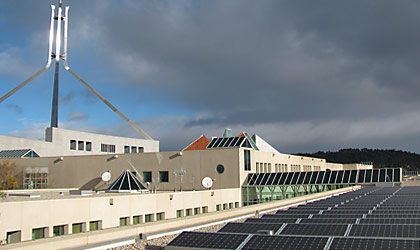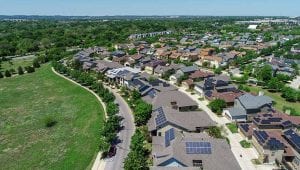Australia has featured prominently in the latest global rankings for climate leadership, thanks to the state-based efforts of Canberra and Adelaide, both of which have been listed among the top 10 cities “setting the bar on climate disclosure” by London-based non-government organisation CDP.
In a list published on Monday, the CDP – formerly the Climate Disclosure Project – ranked Canberra and Adelaide alongside Atlanta (US), Durban (South Africa), Leon (Mexico), Mexico City, New Taipei City (Taiwan), Oslo (Norway), Ravenna (Italy) and Vancouver (Canada) as world leaders in reporting on climate change.

CDP said the 10 cities selected “scored highly for the quality and completeness of their environmental risk reporting,” a form of disclosure it said was “critical” for guiding investment decisions and addressing environmental risks.
“These cities’ accomplishment is significant,” the CDP said in a statement on Monday. “More than 300 cities now use CDP’s system to report on their climate change progress. This group of cities includes many of the world’s largest and greenest cities, including more than 90 per cent of C40 cities.”
On Adelaide, the report praises the Adelaide City Council for being “actively and continuously engaged in climate change mitigation and adaptation” since 1996.
“It has consistently demonstrated leadership in delivering real and lasting reductions in carbon emissions,” the report says.
On Canberra, the report notes the significant efforts the Capital’s government has made to release an annual inventory of greenhouse gases since 1998, calculating emissions back to a 1990 base year.
But the CDP also focuses on the ACT’s world-leading efforts to position itself to take advantage of opportunities arising from climate change action, particularly in encouraging investment in renewables – something Australia’s federal government has so far failed to do.
ACT environment minister Simon Corbell, who has been the major architect of the Capital Territory’s ambitious policy push into renewables and energy efficiency, said his government had demonstrated that moving to a low-carbon economy was achievable, affordable and economically sound.
“Through our pioneering reverse auctions we have secured the necessary renewable energy to supply 90 per cent of our city’s electricity needs by 2020,” he said in a statement, adding that the ACT’s first two wind auctions alone had secured more than $400 million in investment.
“By attracting renewable energy companies to Canberra and fostering a positive environment for renewable energy operation, research and development through our progressive policies we have positioned the territory to take advantage of growth in the renewable energy industry.”
Just last week the ACT announced an auction for the additional 109MW capacity of renewable energy needed for it to reach its 90 per cent by 2020 target, including a mechanism to fund additional auctions to subsidise battery storage technology for more than 5000 Canberra homes.
“Battery storage is a game-changer when it comes to renewable energy, allowing better control of how and when energy from renewable sources is distributed,” Mr Corbell said.
In Adelaide, state climate minister Ian Hunter said the report underlined the joint commitment of the government and Adelaide City Council to make Adelaide the world’s first carbon neutral city.
“This international report is another feather in the cap in the city’s race to become carbon neutral,” he said. “It provides credibility and adds to our international reputation as the place to come and build the businesses for the low-carbon economy of tomorrow.”
To this end, Adelaide has introduced the Sustainable City Incentives Scheme which provides grants to businesses and residents to install solar, battery storage and LED lights. To date, $135,000 in grants has leveraged more than $1.3 million in investment.
It also has the Building Upgrade Finance mechanism, which provides City of Adelaide property owners with access to new sources of finance incentives to upgrade their buildings.
Other actions include greening Adelaide’s streets to provide more shading and cooling, and encouraging more sustainable transport modes such as electric vehicles, cycling, walking and public transport.










